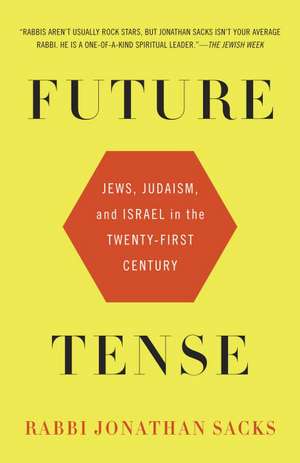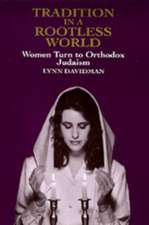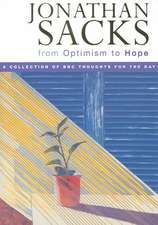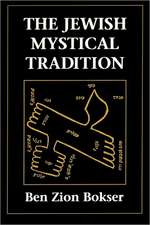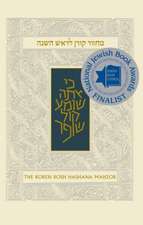Future Tense: Jews, Judaism, and Israel in the Twenty-First Century
Autor Jonathan Sacksen Limba Engleză Paperback – 6 aug 2012
| Toate formatele și edițiile | Preț | Express |
|---|---|---|
| Paperback (2) | 69.45 lei 3-5 săpt. | +8.47 lei 6-12 zile |
| John Murray Press – 13 mai 2010 | 69.45 lei 3-5 săpt. | +8.47 lei 6-12 zile |
| SCHOCKEN BOOKS INC – 6 aug 2012 | 160.74 lei 38-45 zile |
Preț: 160.74 lei
Nou
Puncte Express: 241
Preț estimativ în valută:
30.78€ • 32.05$ • 25.54£
30.78€ • 32.05$ • 25.54£
Carte tipărită la comandă
Livrare economică 10-17 februarie
Preluare comenzi: 021 569.72.76
Specificații
ISBN-13: 9780805212297
ISBN-10: 0805212299
Pagini: 292
Dimensiuni: 132 x 201 x 25 mm
Greutate: 0.32 kg
Editura: SCHOCKEN BOOKS INC
ISBN-10: 0805212299
Pagini: 292
Dimensiuni: 132 x 201 x 25 mm
Greutate: 0.32 kg
Editura: SCHOCKEN BOOKS INC
Notă biografică
Rabbi Jonathan Sacks is Chief Rabbi of the United Hebrew Congregations of Great Britain and the Commonwealth and has received honorary degrees from universities around the world. He is the award-winning author of more than twenty books, writes frequently for The Times (London) and other periodicals, and is heard regularly on the BBC. Lords Sacks was made a Life Peer in 2009.
Extras
Prologue
‘Yesterday,’ said the fabled politician, ‘we stood at the edge of the abyss, but today we have taken a giant step forward.’Jewish history can sometimes feel like that: danger, followed by disaster. It does today.
Sixty years after its birth, the state of Israel is deeply isolated. It faces missiles from Hezbollah in the north and Hamas in the south, two terrorist groups pledged to Israel’s destruction. It has fought two campaigns, Lebanon in 2006, Gaza in 2008–09, whose outcome has been inconclusive. In the wings is Iran and the threat of nuclear weapons. Rarely has its future seemed so fraught with risk.
At the same time it has faced a chorus of international disapproval for its attempt to fight the new, ruthless terror that takes refuge among civilian populations. If it does nothing, it fails in the first duty of a state, to protect its citizens. If it does something, the innocent suffer. It is a conundrum to perplex the most inventive mind and trouble the most thoughtful conscience.
The existence of the state of Israel would, thought Theodor Herzl, put an end to antisemitism. Instead, Israel has become the focus of a new antisemitism.The emergence within living memory of the Holocaust of a new strain of the world’s oldest hate is one of the most shocking developments in my lifetime.
Were these the only problems facing the Jewish people, they would be formidable. But there are others that weaken from within. There is the crisis of Jewish continuity. Throughout the Diaspora on average one in two young Jews is, through outmarriage, assimilation or dis affiliation, choosing not to continue the Jewish story; to be the last leaf on a tree that has lasted for four thousand years.
There is the eclipse of religious Zionism in Israel and modern orthodoxy in the Diaspora, the two forms of Judaism that believed it was possible to maintain the classic terms of Jewish life in the modern world. Jews are either engaging with the world and losing their Jewish identity or preserving their identity at the cost of dis engaging from the world. There are continuing divisions within the Jewish world, to the point that it is difficult to speak of Jews as one people with a shared fate and a collective identity.
This book is about all these issues, but it is also an attempt to get beneath them. For there is something deeper at stake, something fundamental and unresolved about the place of Jews, Judaism and Israel in the world. ‘A picture held us captive,’ said Wittgenstein, speaking about phil osophy. The same, I believe, is true of Jews. An image of a people alone in the world, surrounded by enemies, bereft of friends, has dominated Jewish consciousness since the Holocaust. That is understandable. It is also dangerous. It leads to bad decisions and it risks becoming a self-fulfilling prophecy.
Jews need to recover faith—not simple faith, not naïve optimism, but faith that they are not alone in the world. The former Soviet dissident Natan Sharansky, imprisoned for his wish to leave and go to Israel, tells the story of how his wife, Avital, gave him a Hebrew book of Psalms to sustain him in the hard years ahead. The Russians confiscated it and he fought for three years to have it returned. Eventually it was.
Sharansky knew little Hebrew, but he treated the book as a code to be deciphered, which he eventually did. He recalls the moment one line yielded its meaning, the verse from Psalm 23: ‘Though I walk through the valley of the shadow of death I will fear no evil for you are with me.’ It was an epiphany. He felt as if someone had written those words directly for him in that place, that time. He survived, won his freedom, and went to Israel. He carries the book with him to this day.
Sharansky is a living symbol of the Jewish people through time. Often enough they too lost their freedom, but as long as they felt ‘I will fear no evil for you are with me’, they had an inner resilience that protected them from fear and despair. It was not a naïve faith, but it was awesome in its power. Jews kept faith alive. Faith kept the Jewish people alive. Faith defeats fear.
Fear, on the other hand, generates a sense of victimhood. Victims feel themselves to be alone. Everyone is against them. No one understands them. They have two choices: either to retreat within themselves or to act aggressively to defend themselves. Victims blame the world, not themselves. For that reason, it is a self-reinforcing attitude. Victims want the world to change, forgetting that it may be they who have to change. The victims’ fears may be real, but victimhood is not the best way to deal with them.
Fear is the wrong response to the situation of Jews in the contemporary world. It is easy, surveying the news day by day, to believe that they are the worst of times, but in some ways they are the best. Never before in four thousand years of history have Jews enjoyed, simultaneously, independence and sovereignty in Israel, and freedom and equality in the Diaspora.
The very existence of Israel is as near to a miracle as we will find in the sober pages of empirical history. Israel has had to face war and terror, but it has transformed the Jewish situation by the mere fact of its existence as the one place where Jews can defend themselves instead of relying on the all-too-oftenunreliable goodwill of others. At the same time Jewish life in the Diaspora is flourishing, culturally, educationally, even spiritually, in ways that would have been unimaginable a century ago.
In truth, these are not the worst of times, nor the best of times, but the most challenging of times. Jews today are in a position they have rarely if ever been in before in four thousand years of history. They face the world, in Israel and the Diaspora, on equal terms or, at least, on Jewish terms. What terms are they?
That is the question I address in this book. My argument is that we are in danger of forgetting who Jews are and why, why there is such a thing as the Jewish people, and what its place is within the global project of humankind. In the past Jews lived through catastrophes that would have spelled the end of most nations: the destruction of Solomon’s temple, the Babylonian exile, the Roman conquest, the Hadrianic persecutions, the massacres of the Crusades, the Spanish expulsion. They wrote elegies; they mourned; they prayed. But they did not give way to fear. They did not define themselves as victims. They did not see antisemitism written into the fabric of the universe. They knew they existed for a purpose, and it was not for themselves alone.
Jews, whether in Israel or elsewhere, need to recover a sense of purpose. Until you know where you want to be, you will not know where to go. So this book is not just about the problems facing Jews, Judaism and Israel in the twenty-first century. It is also about the larger question of who Jews are, and why.
I have been intimately involved in all the problems about which I write: the fight against antisemitism, the strengthening of Jewish continuity and, within a Diaspora context, the defence of Israel in the media, academia, non-governmental organisations (NGOs) and British and European politics. My role has been a small one, one voice among many, and it has been a privilege to work with people and organisations, Jewish and non-Jewish alike, who have done so much more.
Yet I have felt something missing from these efforts. That is no one’s fault. It is the price paid for immediacy and involvement. What I sensed missing is the larger picture, the historical perspective, the connection of the dots into a portrait that would show us the who and what and why of the Jewish situation against the broad backdrop of the human and historical landscape. There is a line in the Bible more often quoted by non-Jews than Jews: ‘Without a vision, the people perish’ (Prov. 29:18). Yet it is Jews who should be listening to that verse. They were a people of vision whose heroes were visionaries. That much must never be lost.
In the heat of the moment, people do what they did last time. They revert to type. They choose the default mode. In the present instance, that is the wrong reaction. Things change. The world in the twenty-first century is not what it was in the twentieth or nineteenth. Borders that, a few decades ago, seemed to guarantee Israel’s safety are no defence against long-range missiles. Secular nationalism of the kind that dominated the Middle East after the Second World War is not the same as religiously motivated terror, and cannot be negotiated in the same way.
The old antisemitism, a product of nineteenth-century European romantic nationalism, is not the same as the new, however old the recycled myths. You cannot fight hate transmitted by the Internet in the way you could fight hate that belonged to the public culture. Tell Britons about the rise in antisemitism and, for the most part, they look at you with blank incomprehension. They don’t read it in their newspapers; they don’t see it on their television screens. How are they to know that their next-door neighbour may be inhaling it from a website of whose very existence they are unaware?
Under pressure, people do the predictable. Moses did so once, and it cost him his entry into the Promised Land. The people wanted water. God told Moses to take a stick, speak to the rock, and water would appear. Moses took the stick, hit the rock, and water flowed. Then God said, in effect, ‘You didn’t do what I told you. You cannot enter the land.’
The story has perplexed almost everyone who has ever read it. So large a punishment for so small a sin? Besides which, what actually was the sin? What we forget is that an episode almost exactly the same had happened before, shortly after the Israelites crossed the divided Red Sea. Then God had told Moses to take a stick and hit the rock, which is what he did. On this second occasion he followed precedent. He did what he had done before. We can imagine his thoughts: ‘God said, “Take a stick.” Last time that meant, “Hit the rock,” so this time too I will hit the rock.’
There was one salient difference: a matter of forty years. The first time he was leading a people who, a few days previously, had been slaves. Now he was leading their children, a generation born in freedom. Slaves understand that with a command comes a stick. Free men and women don’t respond to sticks but to words. They need leaders who speak, not strike. Moses, the man who led a generation for forty years out of slavery, was not the man to lead a free people across the Jordan.
Responses right in one age may be wrong in the next. That applies to Jews and Judaism today. I am troubled by the predictability of Jewish reactions, as if the past were still casting its shadow over the present. Today Jews are not victims, not powerless, and do not stand alone. Or, to put it more precisely, thinking in such terms is counter-productive and dysfunctional. Antisemitism is not inevitable, nor is it even mysterious. Nor is there a law of nature that says that Jews must quarrel with other Jews, frustrate each other’s efforts and criticise each other mercilessly, acting as if they were still in the wilderness wondering why they ever left Egypt.
The world has changed and Jews must change, the way they always changed, going back to first principles and asking about the nature of the Jewish vocation, ‘renewing our days’—in that lovely Jewish paradox—‘as of old’.
This is a book I was reluctant to write. There have been so many written in the past few years: about Israel, the new antisemitism, Jewish continuity and the like. I have not sought lightly to add to their number. What I have tried to do is sketch the big picture, the larger vision, and to set it before what I hope will be a new generation, not just of readers but of leaders. I have tried to ask the great questions—who Jews are and what is being asked of them at this time—and whether my answers are persuasive or not, the questions are real and will not go away.
I believe that time-horizons within the Jewish world—indeed, within the West generally—are too foreshortened. We think about yesterday, today and tomorrow while the enemies of Jews and freedom are thinking in decades and centuries, as Bernard Lewis has often argued. In a battle between those who think short and those who think long, the latter win in the long run almost by definition. Tactics are no substitute for strategy; tomorrow’s headlines are not the verdict of history. Jews have been around for two-thirds of the history of civilisation. That is long enough to know that Jewish life needs something more prophetic than crisis management.
So I have tried, in the following chapters, to set the present in the wider context of past and future, and immediate problems in terms of ultimate ideals. My argument will be that we have lost our way and need to recover the classic terms of the Jewish story. That story is not about antisemitism or about Israel as a nation surrounded by enemies. It is not about Jews destined to live alone, at best misunderstood, at worse the perennial target of hate. It is about faith, an unusual faith in which God summoned a people and charged them with becoming his partners in creating lives, and in Israel a society, that would become a home for the divine presence. That faith inspired not only Jews but also Christians and Muslims, whose religion grew in Jewish soil, as well as others who respected the Jewish love of family, community, education, tradition, the pursuit of justice, the passion for argument and the Jewish sense of humour that can laugh even in the face of tragedy.
I believe that this is not accidental. Judaism was never meant for Jews alone. It contains a message for all humanity, and much in the twenty-first century will depend on whether this message or a different one prevails. Judaism belongs to the human conversation, and we must take the trouble to share our ideas with others, and let others share theirs with us. For a long time—most of history—this was simply not possible. The world was not interested in what the Jews had to say. Either they were there to be converted or assimilated, or they were ‘the other’ to be reviled. That has changed, for two reasons.
First, liberal democracies allow space for a multiplicity of voices. We all have a right to speak, and to do so in our own person. That is the glory of liberal democracy. Second, because of the existence of the state of Israel, Jews can speak on equal terms. No longer need they be haunted by the trauma of homelessness.
These are not minor changes. They mean that Jews must go back to the beginning and to the Hebrew Bible and ask again what it is to be Jewish, part of a singular people in a plural world, conscious at one and the same time of the uniqueness of identity and the universality of the human condition. What is it to be true to your faith and a blessing to others regardless of their faith? That is the Jewish question.
The problems confronting Jews in the twenty-first century are formidable, but they confront others as well. Israel faces terror, but so does every free society after 9/11. Jews face hatred and prejudice. So do Muslims, Hindus and Sikhs in Britain, Christians in Nigeria, Buddhists in Tibet and Chinese in the Philippines. Jews worry about whether their children and grandchildren will carry on their trad itions. So does every religious minority in the diverse dem ocracies of the West. Having written books about Jewish continuity, I have been consulted by British Muslims on Islamic continuity and by Hong Kong Chinese on Confucian and Taoist continuity.
It took a non-Jewish writer, the Catholic historian Paul Johnson, in his magisterial A History of the Jews, to state the obvious. The Jews, he writes, were ‘exemplars and epitomizers of the human condition’. They seemed to present ‘all the inescapable dilemmas of man in a heightened and clarified form’. The conclusion he reaches is that ‘It seems to be the role of the Jews to focus and dramatize these common experiences of mankind, and to turn their particular fate into a universal moral.’1 Our uniqueness is our universality.
Jews are not alone in the challenges they face. The world is going through a whirlwind of change, the pace of which it has rarely seen before. In the months while I was writing this book, from the summer of 2008 to the beginning of 2009, the entire global financial structure collapsed. One economy after another went into recession. There was a tragic terrorist attack in Mumbai. Israel conducted a controversial campaign in Gaza. Antisemitic attacks in Britain reached their highest levels since record-keeping began twenty-five years ago. Never before have events in one place had such rapid repercussions everywhere. We find ourselves, in Matthew Arnold’s graphic phrase, ‘wandering between two worlds, one dead, the other powerless to be born’.
It is at this historic moment, more perhaps than at any previous juncture of the Jewish past, that God’s words to Abraham, summoning him to a life through which ‘all the families of the earth will be blessed’, resonate most loudly. Jews are the world’s oldest—until recently, the world’s only—global people. They are the people who rebuilt their lives after the Holocaust, the greatest crime of human against human. Israel is the nation that, under almost constant attack for sixty years, has sustained a free and democratic society in a part of the world that never knew such things. The time has come for Jews to let go of their fears and lay hold again of their historic strengths.
These are controversial propositions, but I do not advance them lightly as academic speculations untested by experience. To the contrary, they are conclusions to which I have been driven as a result of personal involvement in all the issues I address. I have applied them in the field, and they work. I have examined them in the light of our sacred texts, and they cohere.
It is my considered view that, in this tense and troubled century, Jews must take a stand, not motivated by fear, not driven by paranoia or a sense of victimhood, but a positive stand on the basis of the values by which our ancestors lived and for which they were prepared to die: justice, equity, compassion, love of the stranger, the sanctity of life and the dignity of the human person without regard to colour, culture or creed. Now is not the time to retreat into a ghetto of the mind. It is the time to renew that most ancient of biblical institutions, the covenant of human solidarity, made in the days of Noah after the Flood. Without compromising one iota of Jewish faith or identity, Jews must stand alongside their friends, Christian, Muslim, Buddhist, Hindu, Sikh or secular humanist, in defence of freedom against the enemies of freedom, in affirmation of life against those who worship death and desecrate life.
We are entering, said Alan Greenspan, an age of turbulence. The antidote to fear is faith, a faith that knows the dangers but never loses hope. Faith as I understand it is not certainty but the courage to live with uncertainty, the courage Natan Sharansky discovered in his prison cell, the courage that led Jews to rebuild their lives and their ancestral home after the Holocaust, the faith that led generation after generation to hand on their way of life to their children, knowing the risks involved in being Jewish yet never ceasing to cherish the privilege of the challenge. The Jewish people are ancient but still young; a suffering people still suffused with moral energy; a people who have known the worst fate can throw at them, and can still rejoice. They remain a living symbol of hope.
From the Hardcover edition.
Recenzii
“In clear language Sacks sets forth the arguments put forward by atheists, respectfully demolishing them in favor of the religious stance that he forthrightly espouses. The range and depth of his familiarity with authorities in both camps are most impressive [and] his erudite position is largely compelling . . . Essential reading because of Sacks’s splendid range of knowledge and his powerful ability to tackle tough issues.”
—Publishers Weekly
“A brilliant exposition of the possibility of science and religion, each in its own way, contributing to a better world.”
—Kirkus Reviews (starred review)
“Rabbis aren’t usually rock stars, but Jonathan Sacks isn’t your average rabbi. He is a one-of-a-kind spiritual leader.”
—The Jewish Week
“Rabbi Jonathan Sacks is one of the most engaged and engaging thinkers and commentators of our time . . . His writings are always thought-provoking and often profound, and this latest volume is no exception.”
—The Times (London)
"Future Tense demonstrates once again Rabbi Sacks's ability to construct a compelling forward-looking vision of Judaism from classical texts . . . that inspires many on both sides of the Atlantic."
—The Forward
“Rabbi Sacks argues for a Judaism that engages with the world, that emphasizes the radical Jewish belief in human freedom. It’s sorely needed.”
—The Guardian
—Publishers Weekly
“A brilliant exposition of the possibility of science and religion, each in its own way, contributing to a better world.”
—Kirkus Reviews (starred review)
“Rabbis aren’t usually rock stars, but Jonathan Sacks isn’t your average rabbi. He is a one-of-a-kind spiritual leader.”
—The Jewish Week
“Rabbi Jonathan Sacks is one of the most engaged and engaging thinkers and commentators of our time . . . His writings are always thought-provoking and often profound, and this latest volume is no exception.”
—The Times (London)
"Future Tense demonstrates once again Rabbi Sacks's ability to construct a compelling forward-looking vision of Judaism from classical texts . . . that inspires many on both sides of the Atlantic."
—The Forward
“Rabbi Sacks argues for a Judaism that engages with the world, that emphasizes the radical Jewish belief in human freedom. It’s sorely needed.”
—The Guardian
Descriere
Descriere de la o altă ediție sau format:
Chief Rabbi Sir Jonathan Sacks takes a timely look at the ambiguous position of Judaism in the world today.
Chief Rabbi Sir Jonathan Sacks takes a timely look at the ambiguous position of Judaism in the world today.
